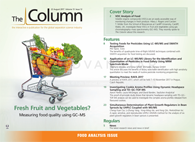Gary J. Patti Receives Agilent Early Career Professor Award
Gary J. Patti is the recipient of the 2017 Agilent Early Career Professor Award.
Gary J. Patti is the recipient of the 2017 Agilent Early Career Professor Award. An associate professor in the Department of Chemistry at Washington University in St. Louis, Missouri, USA, Patti was selected for his contributions to the detection of metabolomics changes in whole organisms and their utility for drug discovery, early detection, characterization, and surveillance of cancer and other diseases and conditions.
Patti takes a systems-level approach to the study of comprehensive metabolism and identification of specific pathways that are altered in connection with particular phenotypes. William Buhro, the chairman of the department of chemistry and the George E. Pake professor in arts and science at Washington University, said that metabolism is one of the most exciting areas in biochemical research and that he and his colleagues are honoured to have one of the world’s best in metabolomics in their department.
The annual Agilent Early Career Professor Award was established in 2008. Through this award, Agilent seeks to recognize the achievements of academic researchers in the initial stages of their careers and to support and develop strong collaborative relationships with them at the beginning of their professional lives.

Analysis of PFAS in Milk by LC-MS/MS
May 15th 2025Dairy milk is one commodity that can be impacted by environmental contaminants, such as PFAS, so it is important to implement extensive, robust, and accurate testing. In this work, a sensitive and reliable method was developed for the analysis of PFAS in milk by LC-MS/MS at levels as low as 0.01 µg/kg.

.png&w=3840&q=75)

.png&w=3840&q=75)



.png&w=3840&q=75)



.png&w=3840&q=75)


![IMG_4773[1].jpg IMG_4773[1].jpg](/_next/image?url=https%3A%2F%2Fcdn.sanity.io%2Fimages%2F0vv8moc6%2Fchroma%2F6db719ea80519dad8e948ad595b96c3fa3731826-200x207.jpg%3Ffit%3Dcrop%26auto%3Dformat&w=3840&q=75)











